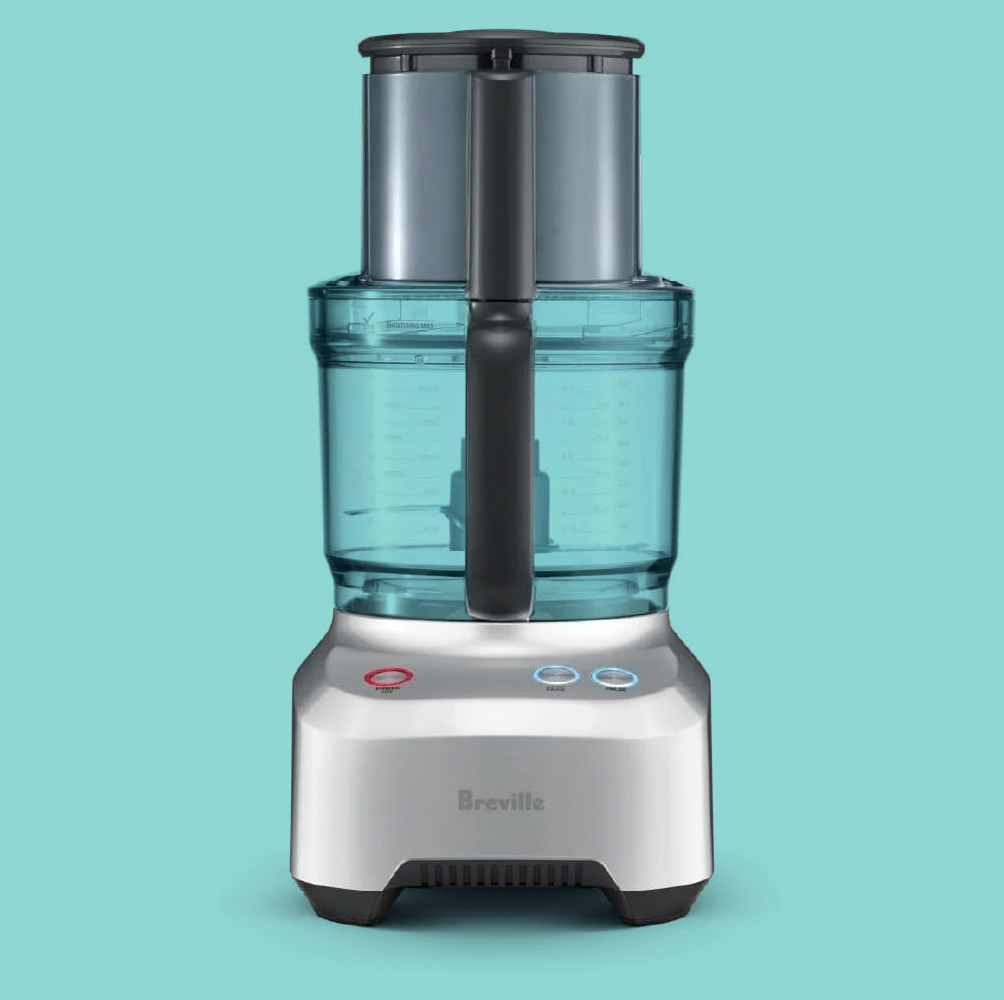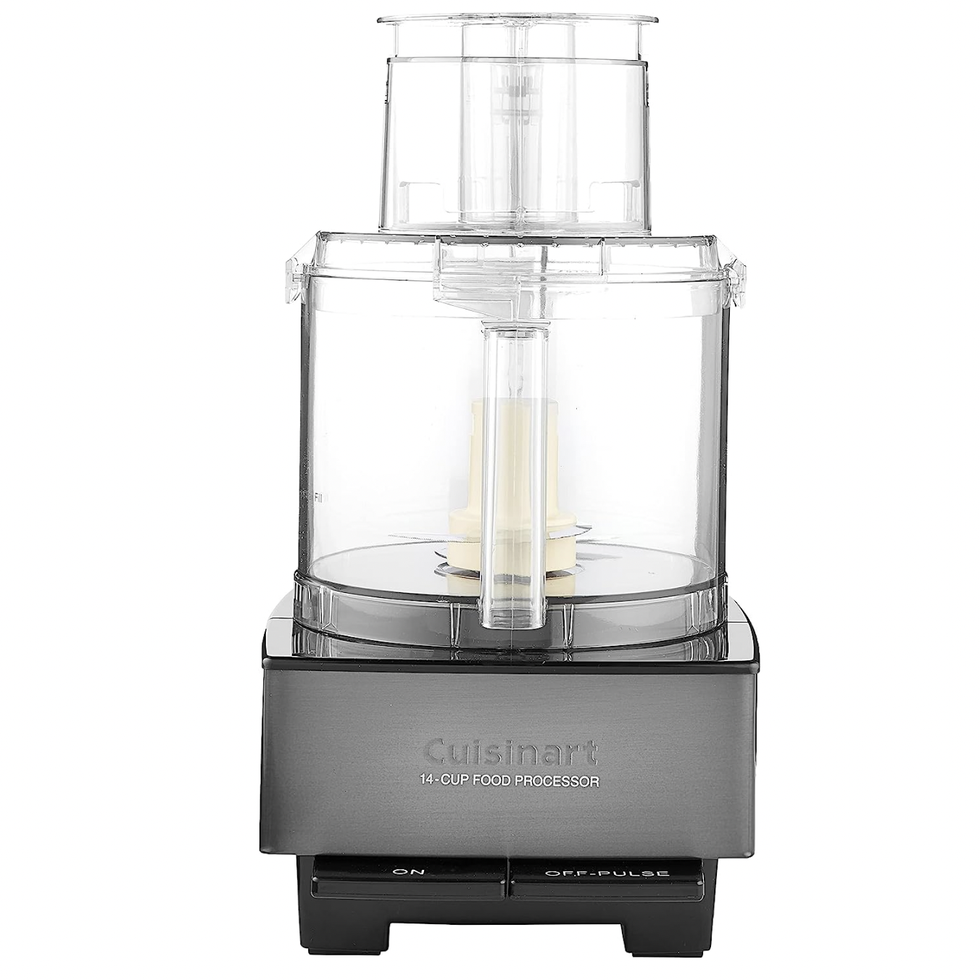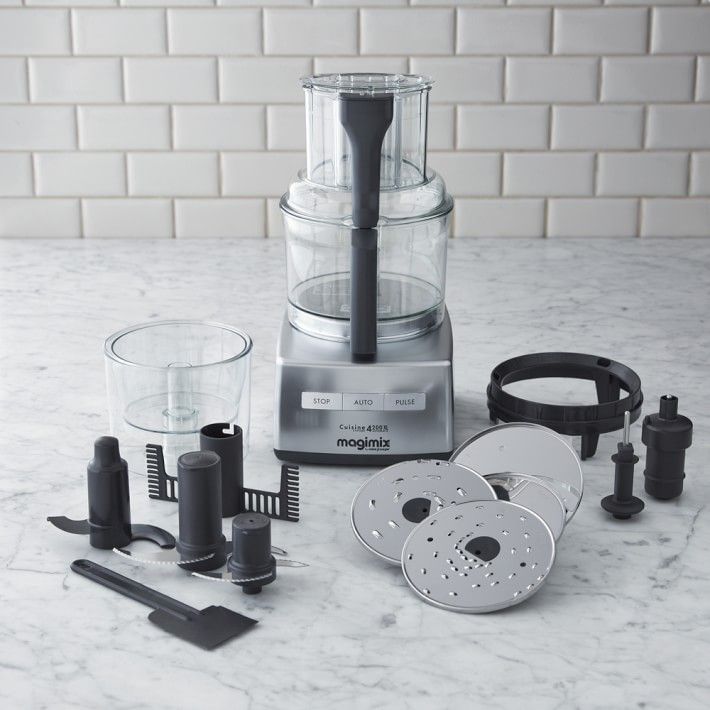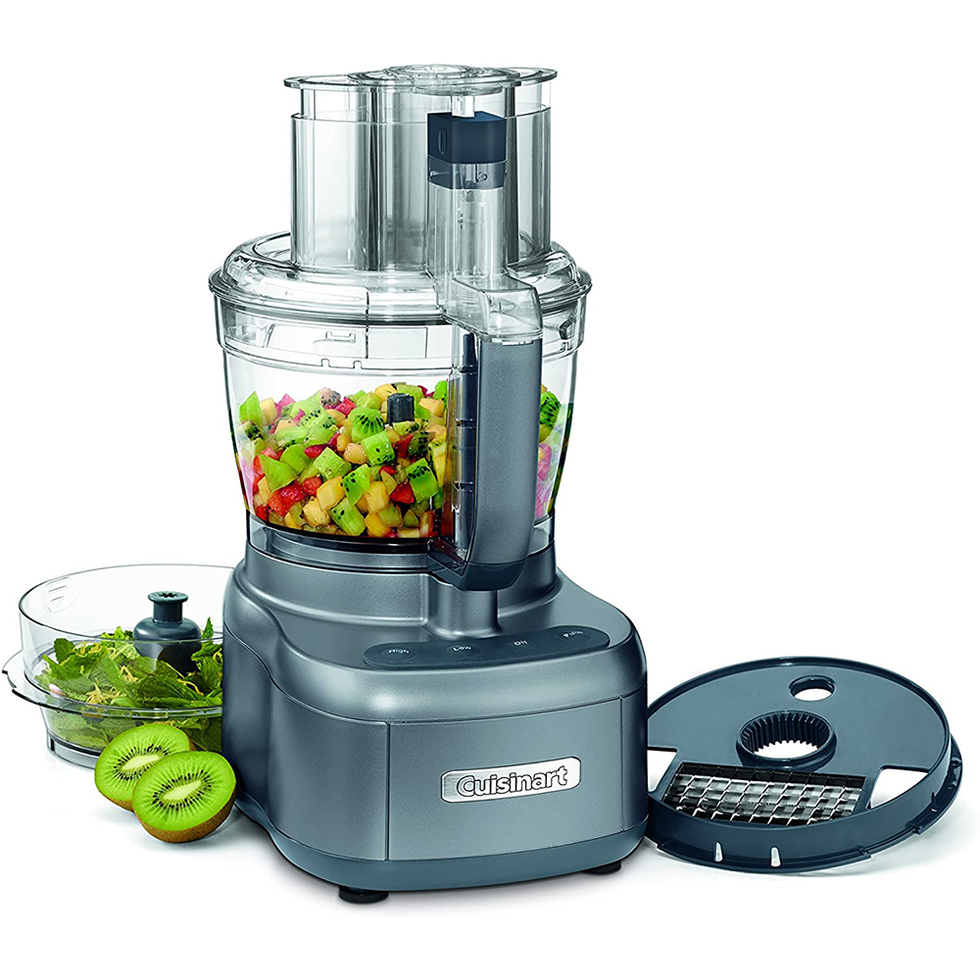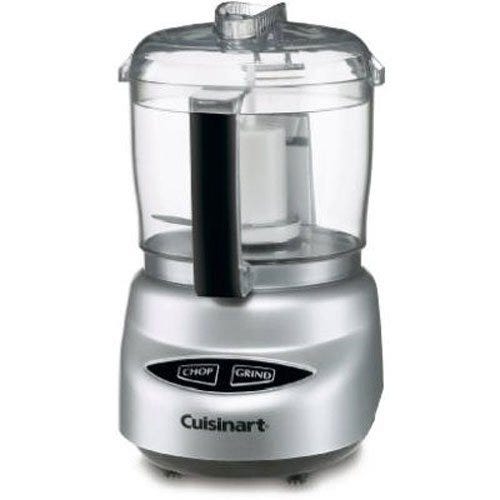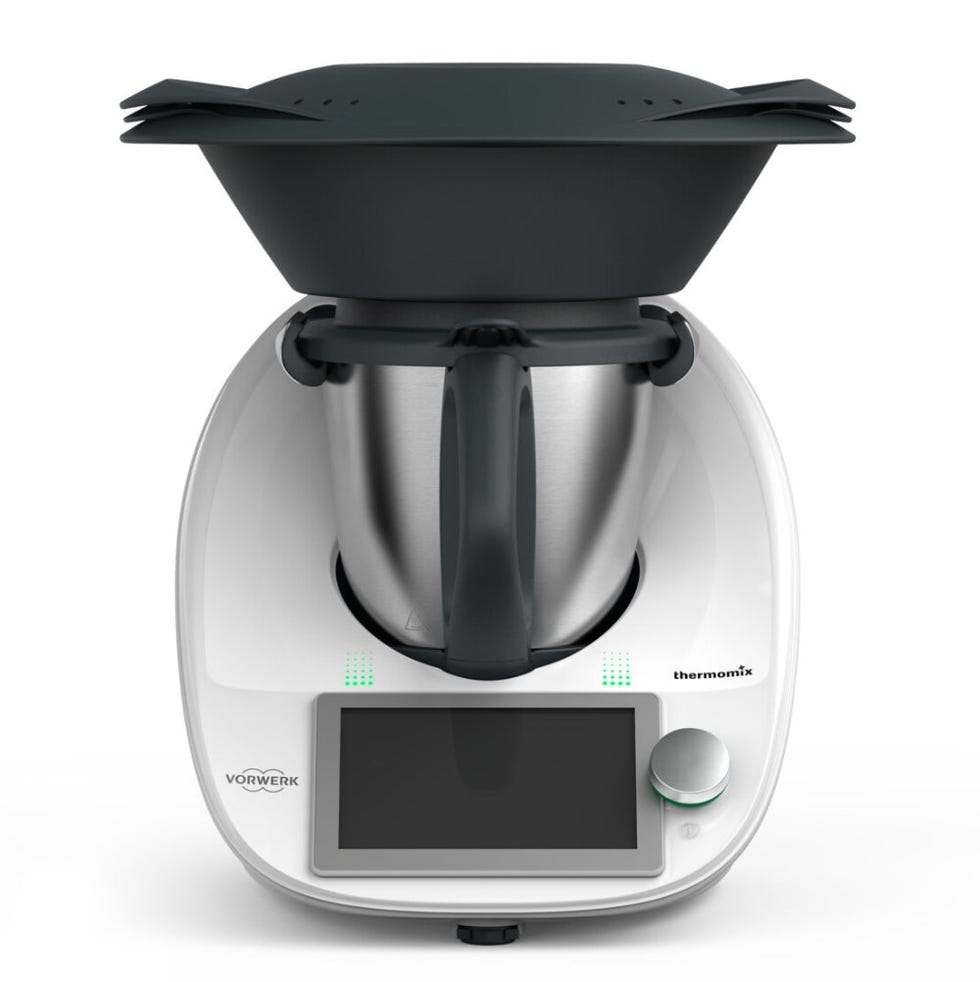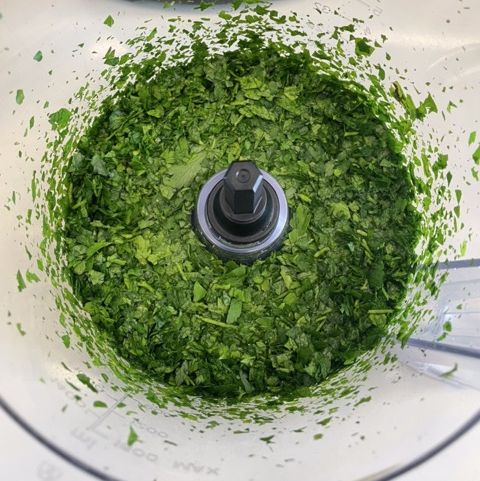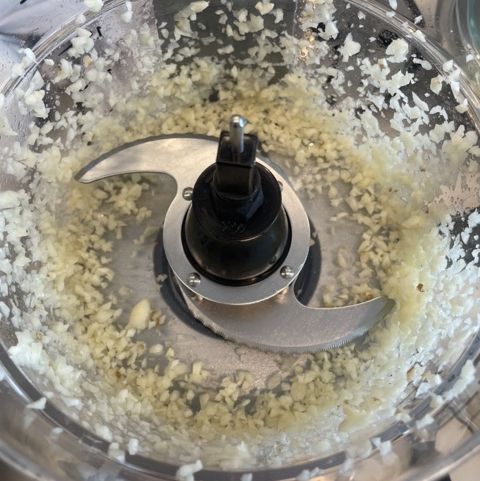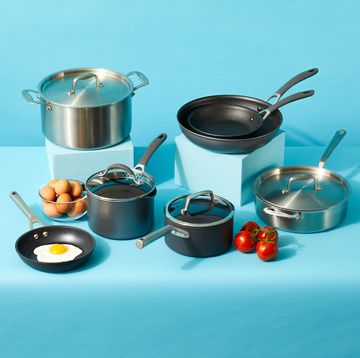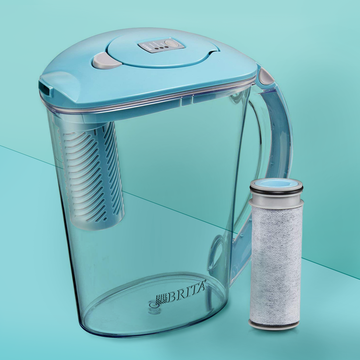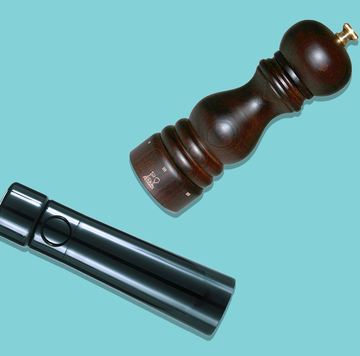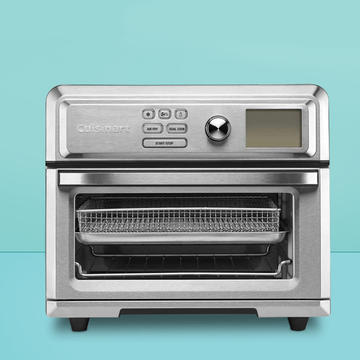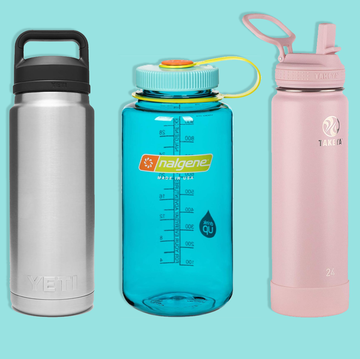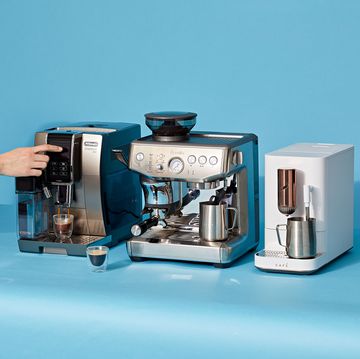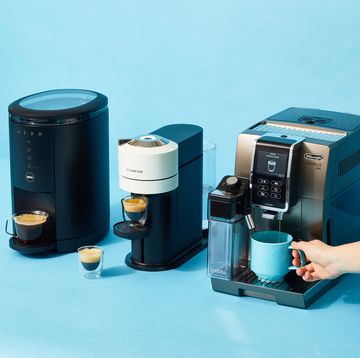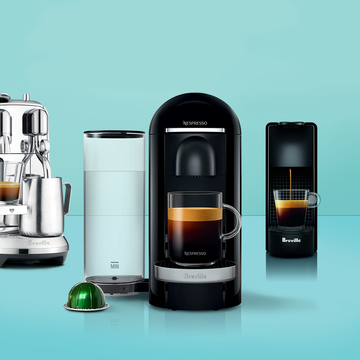A great food processor is the versatile workhorse of a kitchen, making it easy to dice onions for a recipe, mince parsley for seasoning, grind nuts into a smooth butter, knead dough for pizza and pasta, puree tomatoes for sauce, slice fresh veggies, shred cheese and even more. Using a food processor is like having your own personal sous chef, saving you from having to do tons of tedious and tiring prep work.
After testing over 75 food processors in the Good Housekeeping Institute Kitchen Appliances and Innovation Lab, our top pick is the Breville Sous Chef for its top-of-the-line performance, super powerful motor, micro-serrated S-blade and adjustable slicer with 24 settings.
You can read more about how we evaluate food processors in our Lab and consumer tests — plus everything you need to know to shop for your new sous-chef — at the end of this guide.
In-Depth Reviews
Thanks to a super powerful motor, Breville’s Sous Chef is the MVP when it comes to performance. It’s stacked with bells and whistles to give you the ultimate versatility, including a micro-serrated S-blade, an adjustable slicer with 24 settings (ranging from paper-thin to thick-cut), a reversible shredder, a dough blade and more.
This model earned perfect scores in nearly all of our tests, turning out evenly diced onions, minced (read: not bruised) parsley, perfectly ground Parmesan and uniformly sliced tomatoes in seconds. The sleek silver Sous Chef has multiple feeding tubes, one of which is large enough to hold an entire tomato or one-pound block of mozzarella. Keep in mind that this food processor's accessories are not dishwasher-safe and will need extra care with cleaning.
Dimensions: 7.5" x 9.5" x 17" | Bowl capacity: 12-cup | Accessories: Adjustable slicing disc, reversible shredder, dough blade
The Nutribullet NBP50100 Food Processor is a lightweight but sturdy, compact food processor with an affordable price tag of around $130. This intuitive food processor offers three speeds (high, low and pulse) and comes with blade and disc attachments for chopping, slicing, shredding, spiralizing and kneading dough.
In our testing, it ground parmesan and shredded carrots evenly, thanks to the large feed tube that could fit three large carrots at a time. We were also impressed with how it quickly kneaded dough into an incredibly light, fluffy, smooth ball, and how it breezed through parsley without bruising the herb, but note that the bowl did stain a little after processing, though they came off with some dedicated scrubbing.
Dimensions: 7" x 12" x 16"| Bowl capacity: 7-cup | Accessories: Dough blade, spiralizer disc, reversible thick disc, reversible thin disc
This food processor has a solid base so it didn't move around when kneading dough, and the bowl’s straight edges made it easy to scrape and clean in our tests. It has a simple design and performs well: In our tests, it excelled at chopping onions, mincing parsley and grinding Parmesan cheese, as well as slicing pepperoni and tomatoes.
We particularly liked the paddle design of the buttons because they’re wide and operate by pushing down — no fussing with a touchpad. The lid has a large feed tube (for foods like potatoes and cheese) and a smaller one (for skinny items like carrots and celery). The accessories are top rack dishwasher safe for easy cleanup, too.
Dimensions: 11" x 7.9" x 14.8" | Bowl capacity: 14-cup | Accessories: Standard slicing disc, medium shredding disc, spatula
Magimix’s food processor with technology from Robot-Coupe (a brand primarily used in restaurants) brings a professional tool to your home kitchen. Featuring 6-cup, 12-cup and 14-cup mixing bowls, it has you covered whether you need to puree a small serving of baby food or knead brioche dough. It comes with two metal blades, a dough blade, two grating disks, two slicing discs, a Blendermix attachment (turns food processor into blender), an egg whisk, a spatula and a storage box. All accessories are great to have but require some additional learning if you're unfamiliar with them. If you want to upgrade this food processor there are additional attachments for purchase that will transform this food processor into a juicer, citrus press, spiralizer and so much more.
Dimensions: 10" x 8" x 16" | Bowl capacity: 6-, 12-, 14-cup | Accessories: Dough blade, 2 grating discs, 2 slicing discs, blender mixer, whisk, spatula, storage case
This Cuisinart food processor includes interchangeable 13-cup and four-cup work bowls — so you can use it to prep salsa or coleslaw for a large party or just for two. It comes with an adjustable slicing disc, a reversible shredding disc (for medium or fine consistency), a dough blade, a dicing disc, a versatile chopping blade, a cleaning tool and a storage case to hold your accessories.
In our tests, this machine earned high scores at nearly every task, including kneading bread dough and shredding mozzarella cheese. However, it didn't shred hard ingredients, like carrots, as well as other models tested. One of our analysts has this food processor at home and has been using it for over five years and it still performs as well as it did upon purchase.
Dimensions: 11" x 21" x 17" | Bowl capacity: 4-, 13-cup | Accessories: Dicing disc with a cleaning tool, dough blade, reversible shredding disc, adjustable slicing disc
Looking for a food processor, but don’t have the storage space for a full-sized model? This compact option is a smart pick for little kitchens, dorm rooms or those who tend to make small portions.
Ranking at the top of our tests, this three-cup Cuisinart is a great do-it-all size: The chop and grind functions provide versatility to mince ingredients like herbs, onions and meat or grind spices or beans with the blunt side of the blades. It also comes in five different colors, so you can select the one that best matches your decor. Do keep in mind that you have to hold down the buttons continuously during operation or it won't operate, so it may not be ideal for those who like to multitask during food prep.
Dimensions: 7" x 9" x 5" | Bowl capacity: 3-cup | Accessories: Spatula
The Thermomix TM6 offers all the usual food processor functions like chopping, grating, crushing, mincing, grinding and milling — all controlled by its touchscreen and large knob — and so much more. We found that the Thermomix has a larger learning curve than most food processors, but with that came a lot of useful culinary techniques, like steaming and sauté functions, as well as unique features like sous-vide and fermentation. It comes with useful accessories, like a mixing knife for chopping onions and mincing herbs, a spatula, a butterfly whisk for whipping cream and eggs, a splash guard, a Varoma basket for steaming, a simmering basket and a mixing bowl, and even more accessories for purchase, like the blade cover peeler which we tested to peel potatoes for an even easier mashed potato. It even features an integrated scale for weighing ingredients and a heating system.
The biggest downside to the Thermomix is the large price tag, but it can replace about 10 appliances in your kitchen, and the brand offers a complimentary one-hour introductory tutorial so you can learn how to get the most out of it right out of the box. It’s also equipped with thousands of recipes designed specifically for Thermomix via the Cookidoo app. Its smart, connected technology allows for over-the-air software updates that introduce new programs, like bread proofing, and one of its latest innovations is being able to order groceries right through the machine.
Dimensions: 13" x 13" x 13" | Bowl capacity: 9.3-cup | Accessories: Varoma, simmering basket, spatula, splash guard, butterfly whisk
How we test food processors
The Good Housekeeping Institute’s Kitchen Appliances and Innovation Lab has tested over 75 processors in the last few decades. We test food processors for consistency and efficiency and grade each on ease of use, including readability of the owner's manual, assembly, controls and more. Lab analysts test to see how evenly food processors dice onions, mince garlic and parsley, grind parmesan cheese, shred carrots and fresh mozzarella, slice tomatoes, zucchini and pepperoni and knead dough.
We also take note of how quickly each model performed these tasks, weigh ingredients to see how much food was left unprocessed and even put ingredients through sieves to evaluate each ingredient's evenness. If a food processor has additional features like a cooking setting or spiralizing tool we also put those to the test.
We grade ease of use, evaluating how helpful the owner’s manual is; how easy the blades, chute, and lid are to assemble; the intuitiveness of the controls; the variety of settings offered and the cleanability.
What to look for in a food processor
✔️ Versatility: A top-performing food processor should be able to blitz whole or large pieces of fresh produce — like onions, carrots, herbs or potatoes — into uniform dices or minces in very little time. It should be able to take on tasks like grinding hard cheeses, pureeing soups or sauces, making emulsions like mayo and even kneading dough for bread. When shopping, look for a model that can slice and/or shred foods like tomatoes and cheese.
✔️ Accessories: All food processors come with a work bowl for chopping and pureeing — the best ones will include a slicing and shredding disc as well. Other accessories to look for are a smaller work bowl and blade for finer tasks, a dough blade, a dicing accessory and even a blender attachment for smoothies. Most are top-rack dishwasher safe.
✔️ Settings and speeds: Many food processors have just one speed, but some can have high, medium and low speeds. One must-have: A pulse setting. Pulsing lets you incrementally chop food and control the blade to limit your risk of overprocessing. It’s also great for getting an even chop: The stop-and-go motion allows unprocessed items from the top to fall onto the blade to be processed. Otherwise, items close to the blade just continue to be processed making the bottom more fine than the top.
✔️ Weight: A heavier base helps in terms of performance, but heft doesn't necessarily relate to more power. Lighter materials make food processors more affordable and easier to move around and store. Details like suction cups help keep the base from moving around on the countertop.
✔️ Warranty: Food processors are known as an investment, but some people boast that they have had theirs for over 30 years. Before you splurge, take a look at the brand's warranty: The length often varies for motor and accessories.
FAQs
What size food processor should I get?
Looking for more ways to make meal prep a breeze? There are also mini food processors and vegetable choppers for the small home kitchen. Consider the types of tasks you'll be using your food processor for and choose your capacity from there:
- 2- or 4-cup models are for very basic small tasks like chopping herbs, making hummus, pureeing baby food and whipping up dressing or mayo.
- 8-cup models are best for beginners: They're not too big, and not too small. Keep in mind that while they can be used for pastry dough, it would be tough to make bread in this size.
- 12- or 14-cup models are our recommendation for most households. They're versatile and large enough to handle bread dough, and they often come with a second small work bowl for smaller tasks and an assortment of accessories too.
What can a food processor do that a blender cannot?
While food processors and blenders can do similar tasks, they have different strong suits. Food processors are great for chopping, pureeing, kneading dough, slicing, shredding and even dicing or spiralizing — while a blender is meant primarily for soups, smoothies or frozen drinks.
You can use a lot less liquid with a food processor than with a blender and while both can chop and mince ingredients, a food processor will do it more evenly, without bruising ingredients. Food processors can also come with slicers and shredding attachments, giving versatility that blenders lack. Can't decide? Opt for a blender-food processor combo.
Are expensive food processors worth it?
You will have great results with a food processor that costs around $200, but expensive food processors are worth it if you are looking for a model that can perform additional tasks compared to a standard food processor. For example, the Magimix and Thermomix on this list are expensive, but they both offer an assortment of accessories and capabilities: The Magimix comes with three different bowl capacities and a tool to perform blender-like functions, and the Thermomix can be used to cook food and even has steaming and whipping accessories. Some expensive food processors also have longer warranties, which help provide some peace of mind.
Which is the best brand for food processors?
While there are so many food processor brands on the market, there are some brands that have stood out to us for strong performance and ease of use over 20 years of testing: Cuisinart and Breville models have had strong Lab testing results and positive consumer feedback, making them industry standouts.
Why trust Good Housekeeping?
Good Housekeeping Institute Kitchen Appliances & Innovation Lab Director Nicole Papantoniou oversees all of Good Housekeeping's content and testing related to kitchen appliances, tools, gadgets and gear. She's been testing kitchen appliances professionally since 2013.
For this article, she worked with Reviews Analyst Eva Bleyer, who has professionally tested all kinds of kitchen equipment, from oven ranges to juicers to kitchen scales to blenders. Eva has tested many food processors and food processor attachments in her time at the Good Housekeeping Institute. As a trained cook with a background in health-supportive cooking, she also has years of experience using both commercial-grade and home food processors for everything from whipping up creamy hummus to shredding pounds of onions (unfortunately, a few tears were shed).
Eva (she/her) is a reviews analyst in the Kitchen Appliances and Innovation Lab, where she tests kitchen gear, home appliances and culinary innovations. She graduated from NYU with a bachelor of science in food studies, nutrition and public health and is a trained chef through the Natural Gourmet Institute. Eva has more than 10 years of experience in the food industry, working as a food stylist, personal chef and marketing manager.
Nicole (she/her) is the director of the Good Housekeeping Institute's Kitchen Appliances and Innovation Lab, where she has overseen content and testing related to kitchen and cooking appliances, tools and gear since 2019. She’s an experienced product tester and recipe creator, trained in classic culinary arts and culinary nutrition. She has worked in test kitchens for small kitchen appliance brands and national magazines, including Family Circle and Ladies’ Home Journal.
